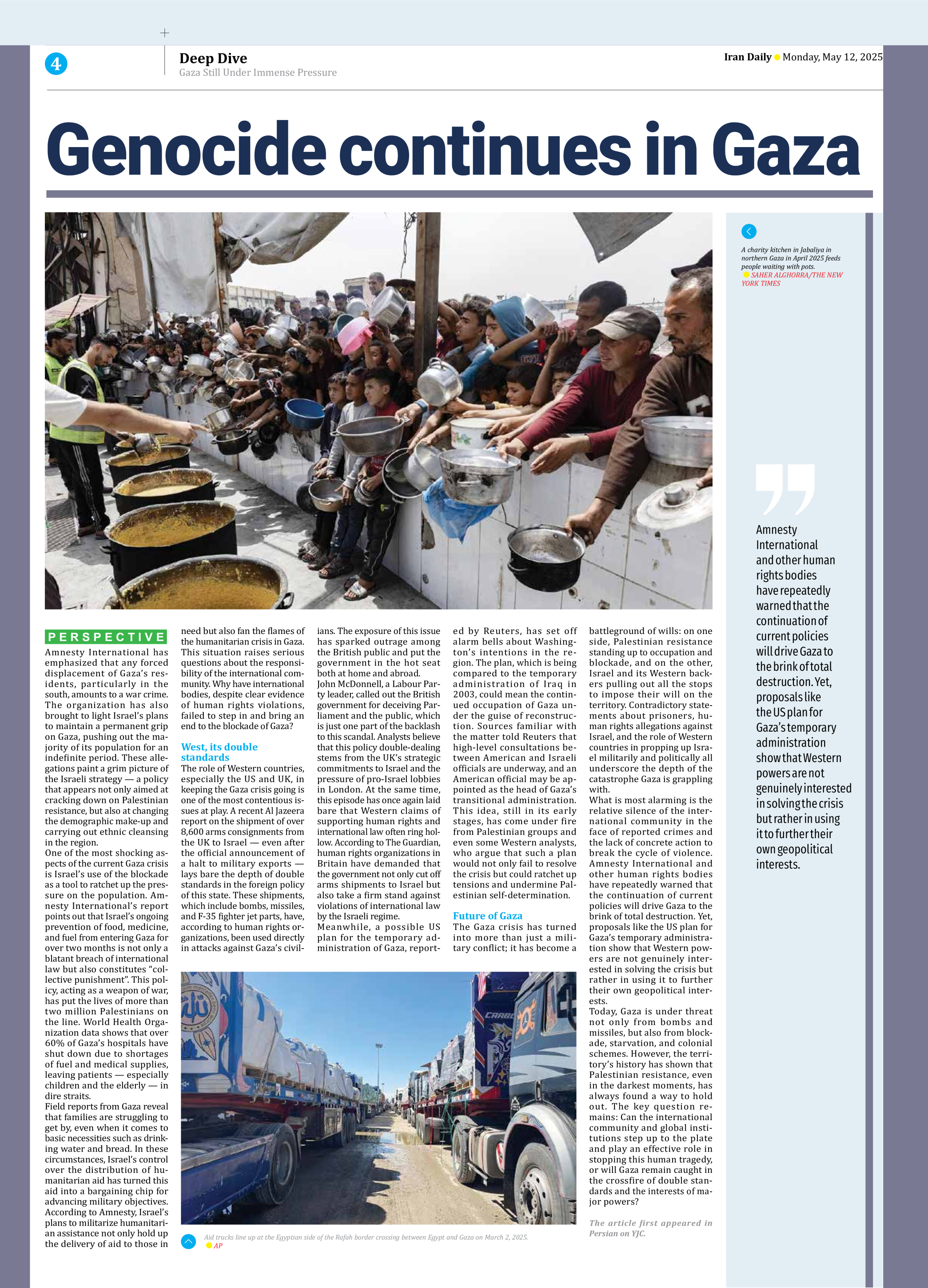
Genocide continues in Gaza
Amnesty International has emphasized that any forced displacement of Gaza’s residents, particularly in the south, amounts to a war crime. The organization has also brought to light Israel’s plans to maintain a permanent grip on Gaza, pushing out the majority of its population for an indefinite period. These allegations paint a grim picture of the Israeli strategy — a policy that appears not only aimed at cracking down on Palestinian resistance, but also at changing the demographic make-up and carrying out ethnic cleansing in the region.
One of the most shocking aspects of the current Gaza crisis is Israel’s use of the blockade as a tool to ratchet up the pressure on the population. Amnesty International’s report points out that Israel’s ongoing prevention of food, medicine, and fuel from entering Gaza for over two months is not only a blatant breach of international law but also constitutes “collective punishment”. This policy, acting as a weapon of war, has put the lives of more than two million Palestinians on the line. World Health Organization data shows that over 60% of Gaza’s hospitals have shut down due to shortages of fuel and medical supplies, leaving patients — especially children and the elderly — in dire straits.
Field reports from Gaza reveal that families are struggling to get by, even when it comes to basic necessities such as drinking water and bread. In these circumstances, Israel’s control over the distribution of humanitarian aid has turned this aid into a bargaining chip for advancing military objectives. According to Amnesty, Israel’s plans to militarize humanitarian assistance not only hold up the delivery of aid to those in need but also fan the flames of the humanitarian crisis in Gaza. This situation raises serious questions about the responsibility of the international community. Why have international bodies, despite clear evidence of human rights violations, failed to step in and bring an end to the blockade of Gaza?
West, its double standards
The role of Western countries, especially the US and UK, in keeping the Gaza crisis going is one of the most contentious issues at play. A recent Al Jazeera report on the shipment of over 8,600 arms consignments from the UK to Israel — even after the official announcement of a halt to military exports — lays bare the depth of double standards in the foreign policy of this state. These shipments, which include bombs, missiles, and F-35 fighter jet parts, have, according to human rights organizations, been used directly in attacks against Gaza’s civilians. The exposure of this issue has sparked outrage among the British public and put the government in the hot seat both at home and abroad.
John McDonnell, a Labour Party leader, called out the British government for deceiving Parliament and the public, which is just one part of the backlash to this scandal. Analysts believe that this policy double-dealing stems from the UK’s strategic commitments to Israel and the pressure of pro-Israel lobbies in London. At the same time, this episode has once again laid bare that Western claims of supporting human rights and international law often ring hollow. According to The Guardian, human rights organizations in Britain have demanded that the government not only cut off arms shipments to Israel but also take a firm stand against violations of international law by the Israeli regime.
Meanwhile, a possible US plan for the temporary administration of Gaza, reported by Reuters, has set off alarm bells about Washington’s intentions in the region. The plan, which is being compared to the temporary administration of Iraq in 2003, could mean the continued occupation of Gaza under the guise of reconstruction. Sources familiar with the matter told Reuters that high-level consultations between American and Israeli officials are underway, and an American official may be appointed as the head of Gaza’s transitional administration. This idea, still in its early stages, has come under fire from Palestinian groups and even some Western analysts, who argue that such a plan would not only fail to resolve the crisis but could ratchet up tensions and undermine Palestinian self-determination.
Future of Gaza
The Gaza crisis has turned into more than just a military conflict; it has become a battleground of wills: on one side, Palestinian resistance standing up to occupation and blockade, and on the other, Israel and its Western backers pulling out all the stops to impose their will on the territory. Contradictory statements about prisoners, human rights allegations against Israel, and the role of Western countries in propping up Israel militarily and politically all underscore the depth of the catastrophe Gaza is grappling with.
What is most alarming is the relative silence of the international community in the face of reported crimes and the lack of concrete action to break the cycle of violence. Amnesty International and other human rights bodies have repeatedly warned that the continuation of current policies will drive Gaza to the brink of total destruction. Yet, proposals like the US plan for Gaza’s temporary administration show that Western powers are not genuinely interested in solving the crisis but rather in using it to further their own geopolitical interests.
Today, Gaza is under threat not only from bombs and missiles, but also from blockade, starvation, and colonial schemes. However, the territory’s history has shown that Palestinian resistance, even in the darkest moments, has always found a way to hold out. The key question remains: Can the international community and global institutions step up to the plate and play an effective role in stopping this human tragedy, or will Gaza remain caught in the crossfire of double standards and the interests of major powers?
The article first appeared in
Persian on YJC.







